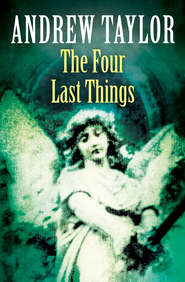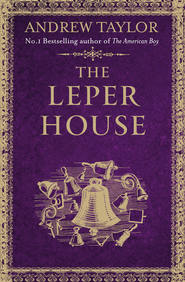По всем вопросам обращайтесь на: info@litportal.ru
(©) 2003-2024.
✖
Richard and Judy Bookclub - 3 Bestsellers in 1: The American Boy, The Savage Garden, The Righteous Men
Автор
Год написания книги
2018
Настройки чтения
Размер шрифта
Высота строк
Поля
Mrs Frant pulled and I lifted; and between us we brought Mrs Johnson to her feet. For a moment she swayed to and fro. But her knees held out and she remained upright, clinging to our arms.
“You felt faint,” Mrs Frant said firmly. “That is what we shall say if we encounter anyone on our way back. You felt faint, and no doubt that is why you are not at the ball. I suggested to you that fresh air might be the best medicine, and Mr Shield was obliging enough to escort us while we took a turn up and down the street. Your stomach is upset, and there is the possibility of an inflammation of the bowels.”
Mrs Johnson groaned.
“Do you understand?” Mrs Frant said. “If we meet anyone, pray remain silent. Mr Shield or I will say whatever needs to be said.”
I own that Mrs Frant’s behaviour both surprised and impressed me. I had not anticipated such firmness of character, such presence of mind in a crisis. We made our way slowly, painfully, back to Fendall House. Mrs Johnson leaned heavily on our arms but did not fall. Gradually the fresh air and the motion revived her slightly, and she took more of her weight herself. I glanced down at her as we came into a circle of lamplight, and saw her haggard face, her disordered hair, and, beneath the stained cloak, a bedraggled ball dress. But she had not changed her shoes: in other words, she had never reached the assembly rooms at the Bell: which suggested that she had intended to go to the ball but something, or someone, had diverted her from her purpose.
We walked, or rather staggered, in silence for most of the way, our feet slithering on cobbles made triply treacherous by their covering of snow and by patches of ice. Fortunately the servants were no longer idling outside the King’s Head so we were spared their catcalls. The only people abroad seemed as drunk as Mrs Johnson. They avoided us, and we avoided them. The snowflakes fell even more thickly than before, which was a blessing because the passers-by kept their faces sheltered from the weather.
At Fendall House, we faced another difficulty, that of avoiding servants. We guided our unstable burden into the tunnel-like alley. The little door was still unbolted. The lobby was empty, though there were voices somewhere in the back of the house. On the stairs, Mrs Frant pulled, I pushed, and Mrs Johnson showed an inclination to collapse.
“You must not,” Mrs Frant hissed. “Come, ma’am, it is only a few steps more.”
“Why must I not?” wailed Mrs Johnson. “What does it matter?”
“You must go on because otherwise I will pinch you until you shriek,” Mrs Frant replied with such resolution in her voice that Mrs Johnson gathered up her skirts and fairly cantered up the remaining stairs.
The burst of energy did not last. She clung to us as we steered her through the labyrinth of passages to the front of the inn, where the Carswalls’ apartments were situated. She moaned almost continuously, a low, mournful drone strangely wearing on the nerves. At one point she muttered, “I wish I was dead. I wish I was dead.”
“We will all be dead soon enough,” Mrs Frant told her.
“Cold, unfeeling woman!” whispered Mrs Johnson. “No wonder –”
“In the meantime, however,” Mrs Frant interrupted, “I am persuaded you will feel much better in the morning.”
We were fortunate to meet no one. At last we attained our own part of the house. Lamps burned in the passage, but when we opened the door of the chamber where Mrs Johnson was to sleep, we found the room beyond lit only by a sullen orange glow from the fire. I helped Mrs Frant lower Mrs Johnson on to the bed and went in search of candles. When I returned a moment later, I found Mrs Johnson lying flat on her back, snoring quietly, still in her sodden ballroom finery.
“Would you be so good as to attend to the fire, Mr Shield?” Mrs Frant said. “Mrs Johnson is very cold.”
So indeed was I. I jabbed the fire with a poker, added a few more coals, and soon there was a respectable blaze in the grate. A moment later, Mrs Frant joined me, and we stood there by the fire, warming our hands. A few yards away behind us, the air pumped noisily in and out of Mrs Johnson’s lungs. I glanced at Mrs Frant, whose cheeks looked flushed in the firelight.
“Should you like me to fetch a doctor, ma’am?”
“I think not.” She turned and looked at me. “Her clothes must be changed, but then the best medicine for her condition is rest and warmth. I know I need not ask you to be discreet.”
I inclined my head.
“We were fortunate not to encounter anyone.” She sat down on the chair by the fire and passed her hand across her forehead. “But we are not safe yet.”
“Has Lady Ruispidge sent a maid for her?”
“I doubt it. If only Kerridge were here.”
“Then we must ring for Miss Carswall’s maid.”
“There is a risk of scandal –” Mrs Frant began.
“There will be a worse risk of scandal if she is not made comfortable. We have to trust someone on Mrs Johnson’s behalf, do we not? She cannot be found like this, ma’am, and you cannot shut yourself up here with her without arousing comment. We should tell the maid that Mrs Johnson is indisposed, and leave it at that.”
“You are in the right of it. I – I might mention to her – the maid, that is – that earlier in the evening Mrs Johnson attempted to revive herself with a glass of brandy.”
“That will be wise.”
Our eyes met. A spark of amusement leapt between us.
“Let us say you went for a stroll,” she continued, “and you chanced to meet her at the Bell, and offered to escort her back. She felt faint, and needed air. You brought her back and came in with her by the side door, to avoid troubling the servants.”
“It will serve, ma’am. And the Ruispidges?”
“I shall write to Lady Ruispidge directly.”
“If you wish, I will deliver your note to their lodgings myself. They will naturally be anxious.”
I knew we understood each other perfectly. Leaving Mrs Frant to minister to the invalid, I returned to the parlour and rang for the maid. In one respect, I was not entirely surprised by the turn the evening’s events had taken. Even in the smallest village, one sees the effect that an unhealthy dependence on liquor has on women as well as men. If a woman might drink in the purlieus of the Strand or in Seven Dials, so too might her more affluent sister in Belgrave-square or indeed Clearland-court. I had noted Mrs Johnson’s high colour from the first, and marked a slurring in her speech; and she was irritable with servants for no good reason.
But there remained much that was puzzling. Why had Mrs Johnson left the Ruispidges so early, though by her dress she had clearly intended to accompany them to the ball? Why had she found it necessary to drink a great deal in a very short time? Why had she left the warmth and safety of the Bell or the Ruispidges’ lodgings? Above all, was her extraordinary behaviour connected with the man who had run away as Mrs Frant and I approached the corner where she lay? If so, who was the stranger?
At last the maid came, her cap awry, her pert face flushed and liquor on her breath. I told her that Mrs Johnson was unwell, that Mrs Frant was at present with her and that she was to take her place and settle Mrs Johnson for the night. I sweetened this intelligence with half a crown I could ill afford, after which the woman’s expression softened.
I led her into the passage, where I tapped on Mrs Johnson’s door. As the maid slipped inside, Mrs Frant handed me a pencilled note for Lady Ruispidge. A moment later I left the house by the side door and walked briskly up Westgate-street to the Cross. The music from the Bell was loud and clear in the night air, and there was a press of people and carriages outside the inn.
The Ruispidges’ lodgings were in a fine, ashlar-fronted mansion at the far end of Eastgate-street. I explained my errand and asked for Lady Ruispidge’s maid. She positively ran into the hall.
“Thank God you’re come, sir,” she said in a rush, her face as shiny as a polished apple. “Is Mrs Johnson safe? I’ve been fretting about her, not knowing what to do for the best.”
Relief made the woman garrulous, and she needed little encouragement to tell her story. Mrs Johnson’s lack of consideration gave her narrative the spice of malice. A boy had brought a letter for Mrs Johnson soon after the party’s arrival in Gloucester, and its contents had depressed her spirits. The maid hinted that it had probably been a bill, and also that such occurrences were not uncommon in Mrs Johnson’s life. She had dashed off a reply, which the boy had taken, and had been in the sullens thereafter.
The party from Clearland-court had dined together before the ball. Mrs Johnson complained of tiredness and the headache and decided to rest on the sofa, which did not please the servants, who had hoped for a few hours to themselves. The Ruispidges had gone to the Bell without her, on the understanding that Mrs Johnson would join them later. Her luggage had already been sent down to Fendall House.
An hour later, a servant of the house had gone to make up the fire and found her gone. He had not thought to mention the circumstance, assuming she had followed the others to the Bell. Lady Ruispidge’s maid had not discovered Mrs Johnson’s disappearance until twenty minutes before my arrival.
Вы ознакомились с фрагментом книги.
Приобретайте полный текст книги у нашего партнера:
Приобретайте полный текст книги у нашего партнера:











